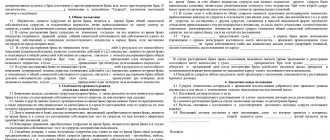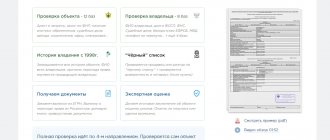Today, almost everyone takes out bank loans, but not everyone is able to repay them, especially if the loan was taken to purchase housing. Mortgage lending rates in Russia are still among the most unfavorable in the world, so repaying the debt often becomes burdensome and even impossible for a borrower who finds himself in a difficult situation. A credit institution insures its risks by drawing up a mortgage document in which the collateral is the real estate itself, for the purchase of which a loan is issued. If the debtor is unable to pay the bank, then the first thing to do is sell the collateral property at auction. From the amount received from the sale, the lender takes the amount due to him (loan plus interest), the remainder is returned to the borrower.
But it happens that even the sale of the apartment does not cover the entire debt, and then the bailiffs confiscate the debtor’s other property. The confiscated property ends up at a bailiff auction after the property is seized, where it can often be purchased at prices below market prices. Many people are interested in how to buy property seized from someone. People often dream of purchasing this kind of housing. Let's figure out how confiscation occurs, how to become a participant in the auction, and whether it is worth purchasing property seized from debtors.
Not everything is legal, what is cheap
The myth that the country is full of confiscated goods that are sold for pennies is zealously supported by those who disguise themselves as real confiscated goods stores. The latter work with the permission of the Russian Federal Property Fund (RFFI), from where they receive all goods (from a batch of thong panties to kitchen corner sofas). The prices are truly amazing.
Fraudsters working under the guise of official sellers of smuggling offer only popular goods - clothes, shoes, phones, household appliances. As we were told at the Pskov customs, the name “customs confiscated” is used by scammers to catch buyers chasing cheap prices. But a good two-thirds of their goods come... from Moscow wholesale markets. Prices in “smuggling” stores are almost no different from the market ones, but you will probably see an illegal announcement: “Purchased goods will not be accepted back or exchanged. There are no warranty cards." When we began to find out why there was no guarantee for a mink coat, the seller shrugged his shoulders and said confidently: “It’s confiscated!”
What are the rules for sales at Rosimushchestvo?
Since October 13, 2015, the rules for the sale of movable property seized in favor of the state have changed (see Resolution of the Government of the Russian Federation N 1041).
Sale of property confiscated in favor of the state
The new rules apply to the following types of property:
- things that are confiscated through court;
- escheated (ownerless) property;
- arrested at customs;
- treasures;
- bequeathed to the state.
Shares and their shares, authorized capitals of KOs are sold by the state in accordance with the law on privatization.
Types of auctions
Two types of auctions are used to sell state property:
- direct, in which the object is sold at the executive price to the first participant to submit an application - things costing less than 100 thousand rubles are put up for them;
- open, in which there are several bidders, and the price is chosen as a result of competition: such auctions include property that costs over 100 thousand rubles.
How are auctions conducted?
Bidding cannot go on indefinitely. There are strict regulations for conducting and managing auctions.
If no one is interested in the property put up for sale within the first 10 days from the date of notification of the auction, the auction becomes downward, and at the third stage the price can be reduced by up to 90%!
- At the first stage, the price is reduced by 30%.
- On the second (that is, after the next 10 days) - by 60%.
- Finally, after another 10 days, if not a single application has been received - by 90%.
The seller records the current condition every 10 days, lowers the price or removes the item from sale. The seller must complete new supporting documentation within three business days after the end of each additional stage of the auction.
If the property is not sold within the time allotted for the auction, it is destroyed.
In fact? The question is, why not just give it to those in need? Information about sold property is published on the website of the Federal Property Management Agency, on the website of the auction organizer, as well as in the media.
How to win at a bailiff auction
- Standard advice (be the first to see the information and submit an application) can only work here when selling low-value property (cheaper than 100 thousand rubles), which has become state property and is sold to the first person you come across.
- If a highly liquid valuable object is being sold, then, on the contrary, it is more profitable to submit an application later than everyone else, just before the start of the auction, offering a higher price (although there is a risk that someone will still manage to beat you at the last second).
- In the absence of other applications and competition, you can show restraint and composure and wait. Check the auction organizer's website after 10 days to see if there has been a price drop.
Unfortunately, there is no legal way to find out about the number of applications submitted and the maximum price offered by participants in order to make your decision. But a lot depends on intuition.
What can you buy at auction?
At the bailiffs' auction, you can purchase movable and immovable property: residential premises, land, cars, equipment, spare parts, precious metals, livestock and much more.
To find out the full list of confiscated goods, you need to click on the arrow in the Confiscated Categories field.
Pros and cons of bailiff auctions
The opportunity to buy property at a significant discount is the main and only advantage of confiscated auctions.
Then there are the disadvantages:
- You are buying an object that you cannot see, that is, with all its possible shortcomings.
- Cheap property may be illiquid, meaning it will be very difficult to sell.
- If the former owner of the property is able to prove that it was confiscated illegally (and how much of this happens in the courts!), then it will have to be returned. The money paid will be returned to the auction participant, but no one will pay for the lost time, nerves and vain hopes.
Finally, there is also a moral side to the matter: what is often put up for bailiff auctions is not the property of those who live in abundance, but the belongings of people living from paycheck to paycheck (which is why they are unable to repay the loan). And this means that there are probably someone’s tears on it (for a moment, imagine the experiences of those whose apartment was taken away!). It is unlikely that such an acquisition will bring happiness. Although to someone who wants to grab something cheaper from what was confiscated for debts, this may seem like a stupid superstition.
For the chosen ones
If you are offered to buy cheap contraband through friends who work at customs, at the UBEP or at the Russian Federal Property Fund, then you have found yourself in the circle of “selected buyers”. A summer scandal involving arrests and interrogations of officials and security forces responsible for the lucrative sphere of confiscation revealed a get-rich-quick scheme. As the prosecutor’s office found out, Moscow bosses received information about smuggled goods from customs, and “honest” representatives of the law were already waiting for the truck in Moscow. Who confiscated the goods without drawing up the necessary documents, which allowed them to pocket all the profits from the sale. Customs officers often trade on their own, without the help of their capital colleagues. Why register a discovered cargo if you can make good money on it by selling it online? Or by supplying to numerous relatives and friends who will not tell anyone about regular purchases under the counter. After all, this is such savings for the family budget!
The “destruction” of counterfeit goods also brings a good increase in salary. Considering that out of 10 “left” batches only one is recycled, it is not difficult to guess in whose pockets the remaining 9 end up.
In September, FSB and Ministry of Internal Affairs officers confiscated a cargo of black caviar weighing 460 kg at the Chkalovsky airfield near Moscow and demonstratively destroyed it. After all, from August 1, the sale of sturgeon caviar is prohibited. But how much counterfeit is NOT destroyed! The same caviar is quietly sold in markets; hundreds of thousands of unlicensed CDs, seized by law enforcement agencies, again end up on sale, instead of going to the rink.
Europe has long ago solved the problem of confiscated goods. Without any assessment, accounting, or sales schemes, contraband is dumped into one heap and destroyed. Perhaps it’s time for us to stop pretending that illegal goods can bring income to the state? Much more money is spent on salaries for officials, storage of illegal goods and their sale.
PS
Do not fall for the bait of Internet companies that promise to send a batch of cell phones detained at customs as soon as you transfer 100% prepayment to their account. You will simply lose money.
Expert opinion
— Where are confiscated goods officially sold?
“Information about sales is posted on the websites of the fund and its branches ( fpf.ru ),” says Yuri Rusin, head of the Department for the Sale of Seized, Confiscated and Other Property of the Russian Foundation for Basic Research.
— The media are sometimes used, but mandatory publication in any specific newspapers is not provided for by law and is not widely used. Why spend 500 rubles? for advertising about a product worth 1 thousand rubles?
Bailiffs auction: confiscation and purchase of seized property.
The confiscation process is long and goes through certain stages:
- First, upon application of the bank or other credit institutions to the Federal Bailiff Service (FSSP), enforcement proceedings are initiated.
- The case is transferred to the bailiff, who notifies the debtor of the need to repay the specified amount of debt within five days.
- If the debt is not repaid within the established period, the bailiff is sent to the borrower’s residential address to seize the property.
- The bailiff describes the debtor's property, and only those valuables that can be confiscated by law are subject to confiscation. It is impossible, for example, to confiscate the only housing or property without which a person’s life is impossible (food, clothing, tools necessary for professional activities, etc.). A complete list of what cannot be confiscated is contained in Art. 446 Civil Code of the Russian Federation
- The bailiff draws up documentation for each confiscated item indicating its value.
All confiscated goods are entered into the confiscated goods database, which can be found on the website konfiskator.com.
- You can buy confiscated property at auctions of bailiffs, and the auctions are organized by a government agency - Rosimushchestvo.
- In some cases (mainly the sale of objects that are not of great value), the authority to sell the confiscated property may be transferred to other commercial organizations.
How to purchase property from bailiffs
Bailiffs post all auction items on their website konfiskator.com. The minimum price at which each lot can be sold is also indicated here.
By clicking on the name of the confiscated item, you can see:
- lot number and relevance;
- date of publication of the notice of sale;
- date and time of the auction;
- e-mail address of the trading site.
Attention! From January 1, 2021, trading will take place exclusively on electronic platforms.
That is, no halls, signs of participants, shouts of “who is bigger?” and soul-filling excitement. Bidding information can also be found:
- in official media;
- on the website of the organization that will conduct the auction;
- on the website of the Federal Property Management Agency.
Auctions for the sale of property, with the exception of those confiscated in favor of the state, are mainly upward:
- the executive document indicates the starting minimum price;
- Of all the offered prices, the maximum is selected, therefore, the participant who gave the highest price wins.
The auction becomes downward when there are no bids and objects with low liquidity are sold.
Please keep in mind that the properties offered are not shown to potential buyers until they have paid the price determined at the end of the auction. Thus, having won the auction, you can see the confiscated property only after purchasing it.
How to apply for an auction
Any individual/legal entity can take part in the auction.
- To do this, an application is submitted to the auction organizer and a deposit is paid to the organizers.
- The special commission for bidding makes a decision on the admission of the applicant, entering all information about him into the protocol.
What documents are needed to participate in the auction?
The package of documents required is approximately the following, depending on the situation:
- an application drawn up in a standard form (two copies);
- copy of the passport;
- consent of the second spouse (if the participant is an individual);
- constituent and financial documents of legal entities proving their solvency;
- documents confirming the authority of representatives from individuals or legal entities to participate in the auction;
- the sealed envelope indicates the offer price (the price at which the participant agrees to buy the confiscated property);
- a list of all submitted documents.









